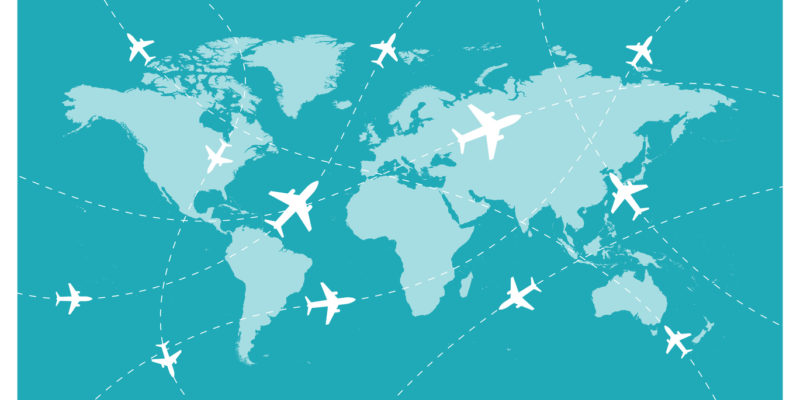Communicating During a Crisis Why Regular Communication with Stakeholders is Important, Even if you Don’t Have New Information to Share We are six months into a new year, a new decade, and a new normal. International and domestic borders are shut down, employees are working from home indefinitely, and the world has more-or-less come to a standstill as a result of the COVID-19 pandemic. As we all traverse the many obstacles presented during this crisis, it is important to remember the crucial role that communication plays. It might seem easiest to tackle one obstacle at a time during a crisis and wait to communicate with stakeholders until you have solutions to the problems at hand. Chances are, though, you likely won’t be able to answers all the questions before another issue presents itself. Our advice? Communicate anyway. Communicate early, regularly, and often to stay in touch with important stakeholders. Ongoing communication allows you to share facts, data, and decisions; instill and foster confidence and trust in your organization; and at the very least, let them know you’re still in business. Stakeholders need facts, data, and decisions from trustworthy sources. During a crisis, the number one thing your stakeholders want from you is a partner they can trust. They want transparent facts about what is (or is not) happening, to know what they can expect and how it will impact business, and what measures you are taking to weather the storm. There will undoubtedly be an influx of misinformation, as we have seen during the COVID-19 pandemic. Put everyone at ease by collecting information from reliable sources, taking the time to digest it, and then sharing that information clearly and frequently. Communication builds brand loyalty and customer confidence. When you establish good communication in normal times (with no crisis), your partners trust you and feel taken care of. When you continue with that same level of communication during a crisis, it instills confidence that they are dealing with a professional organization; they feel like they haven’t been, and won’t be, forgotten in the midst of the chaos. Happy travelers, employees, and partners is a win-win-win situation. Happy travelers become loyal customers (who share their experiences with friends and family); satisfied employees feel cared for by their employer and are therefore motivated to continue their good work; and clients feel that they have a true partner that will help them weather any storm. Silence leads to doubts. When a company goes quiet during a crisis, stakeholders assume one of two things: 1. You’re not thinking of them and their concerns or 2. Your business is in trouble. Don’t let anyone assume the worst. Stay top-of-mind by communicating regularly with important people, even if you don’t have anything new or important to pass along. Communication doesn’t always have to have an end goal of delivering new information. Sometimes, the goal of communicating is much simpler—to let them know you’re thinking of them, to share that you are working on a post-crisis plan, and to remind them that you’re available to answer their questions. Communicating to travelers Just like partners, travelers, too, need consistent, reliable, and early communication. They need to feel trust in their travel provider and support from any business into which they’ve invested their time and money. Here is what some of our travelers have said after receiving our regular traveler communications: “Many thanks for sharing the current status of our Ireland trip, given the virus concerns around the world. We completely trust that ATA will make appropriate decisions concerning the travel risk associated with COVID-19!” “Thanks for the update. For what it’s worth, we’re willing to wait until the last minute for a decision. But if travel isn’t possible in October of this year, we’d prefer to reschedule rather than cancel.” “Hiya and thanks for your email re: the potential cancellation of the Looted Art trip. Completely understand. Perhaps I am an eternal optimist, but I am ever hopeful. So I shall do what the ancients have suggested: prepare for the worst and hope for the best.” “Thank you for the update. I can’t say it hasn’t crossed my mind, but I usually am a positive, non-worrying type. Thanks for keeping us informed.”
Blog
Our Statement on Racism and Injustice
We are in awe of the courageous communities across the U.S. (and the world!) taking action against police brutality, racial inequity, and other forms of systemic racism that target and harm Black communities. We are inspired by the crowds rising up in the streets, those donating money, time, and resources from home, and everyone taking this all to heart and educating themselves, their families, and their friends. We grieve for those that we’ve lost over the years and those lost recently: George Floyd, Breonna Taylor, Tony McDade, Ahmaud Arbery, and Nina Pop among too many others. But it is not enough to be in awe, we must all do the work. We, at Academic Travel Abroad, are committed to the long-term unlearning of biases within our own organization, as well as listening to and amplifying the voices of Black students, travelers, partners, and colleagues in educational travel and international education. As a first step, we are matching staff donations to organizations of their choice. We are also encouraging our staff to use their philanthropy leave to find their own meaningful ways to contribute to ongoing efforts. We don’t have all the answers, but we are committed to standing in solidarity with Black communities and doing our utmost to work toward a more equitable future.
Message from ATA Owners About COVID-19
Message from ATA Owners About COVID-19 Dear Partners, We are only a few months into 2020, and what a year it has been. Academic Travel Abroad is celebrating its 70th year in 2020, and like everyone else in the world, did not envision that this year would unfold in this way. We have experienced and persevered through many crises over the last seven decades including Chernobyl, Tienanmen Square, two Gulf Wars, 9/11, SARS, the Arab Spring, and the Great Recession. COVID-19 is truly unprecedented, yet previous crises have taught us that ATA and its study abroad division, CET Academic Programs, will survive to thrive again, made stronger through this test of endurance. It should come as no surprise, but many of our core truths have been reaffirmed during this time: our teams both in the U.S. and overseas perform brilliantly under great duress, approaching their work methodically, lucidly, and with compassion. Our suppliers and host universities abroad are integral to our ability to weather this storm through their flexibility, sacrifice, and support. And our partners in educational travel and study abroad continue to impress us with their professionalism, collaboration, and humanity throughout our joint handling of this crisis. We are forever grateful for all of you. After this extraordinary pause in human mobility, it is our hope that the lessons gleaned from this crisis will include a revitalized thirst for knowledge and exploration, a deeper compassion for this planet and all living creatures, an appreciation for the power of human connection, and a sincere reverence for life itself. Rest assured, we will be here and ready to help you and your travelers explore this new world when it welcomes us once again. Wishing you all around the world both health and peace, Kate Simpson Chase Poffenberger Mark Lenhart
The San Francisco Ballet Goes to London
The San Francisco Ballet Goes to London When the San Francisco Ballet returned to London in June 2019, it was the first time the company had performed in the city for seven years. To celebrate the occasion, they invited their top donors to join them for a week of world-premiere performances, receptions and dinners with the company, and private visits to some of the city’s lesser-known treasures. Their most important priority: engaging with their dedicated supporters and strengthening relationships through intimate gatherings and inspiring cultural experiences in London. What they didn’t want to worry about was the logistical details. That’s where ATA came in. Hosting a week of high-touch elegant events for VIPs is a bit like planning a series of small weddings. It requires a mastery of complex logistics, a network of tried-and-true contacts on the ground, a knack for creative thinking and problem solving, and a generous amount of inspiration. Our team worked with the Office of Development to craft and plan every element of the program, from designing a custom itinerary and brochure to taking reservations, working with a London florist, planning menus and providing options and upgrades for each guest. Every detail needed to reflect our client’s vision. The group of 20+ donors was treated to six magical nights in London, featuring four performances of the San Francisco Ballet at London’s prestigious Sadler’s Wells Theatre. In addition, donors enjoyed an exclusive behind-the-scenes visit to watch Royal Ballet rehearsals at the Royal Opera House; private receptions and dinners; a rare, curator-led tour of the dance collection at the Victoria and Albert Museum’s Blythe House; and an excursion to Althorp House—ancestral home of the Spencer family and burial site of Princess Diana—for a private lunch and tour. One of the program’s highlights was a gala evening, for over a hundred guests hosted, at the enchanting Two Temple Place, a gem of late-Victorian architecture built for Lord William Waldorf Astor. Over cocktails and dinner within this sumptuous but intimate mansion, the donors were able to mingle with the dancers, musicians, choreographers, and directors they generously support. In her letter inviting donors on the trip, Chief Development Officer Danielle St. Germain-Gordon promised an experience that would be “exciting, educational, and busy…a memorable week for us all.” With ATA backstage, planning and operating the program, they delivered on their promise, making the San Francisco Ballet’s return to London an unforgettable experience for its benefactors.
Staff Achievements
We’ve always known we have talented employees at ATA. So when a team member is recognized by the outside world through awards or certifications, we are proud, but not surprised. Let us boast about a few of our most recent achievements: Kate Simpson, President of Academic Travel Abroad Surrounded by friends, industry colleagues, mentors, and supporters, Kate Simpson accepted the National Tour Association’s Woman of Vision award at the 2019 Travel Exchange convention. She was honored for both her commitment and leadership in the industry, as well as her work as a co-founder of the Fund for Education Abroad. Kate’s words in accepting the award inspired the room: I believe in the transformational power of travel, in all its forms. We all do noble work, and contribute to building a more enlightened, more just, and more connected world.” Jocelyn Flint, Senior Director of Employee Communications and Training In late December, Jocelyn earned the Association for Talent Development’s Instructional Design Certificate, an achievement that positions Jocelyn for the next step in her development: to become a Certified Professional in Learning and Performance. Jocelyn is devoted to learning and her assiduous pursuit of knowledge within the fields she works is not only impressive, but benefits the entire organization as she fastidiously applies her knowledge practically to her role at ATA. Congratulations, Jocelyn! Jennifer Calvert, Executive Director of the Fund for Education Abroad The Fund for Education Abroad (FEA) was founded by ATA executives, who serve on its board, and is heavily supported financially by ATA. FEA is committed to increasing the opportunities for dedicated American students to participate in high-quality, rigorous education abroad programs by reducing financial restrictions through the provision of grants and scholarships. Jennifer was awarded the prestigious Certified Fund Raising Executive certification in December of 2019. This impressive achievement validates what we have already known for a while—Jennifer is a gifted development professional, and her tenure at FEA is a gift to the organization. Her pursuit of this certification in the midst of all her FEA responsibilities is a testament to her hard work and dedication. We are proud to have Jennifer lead this organization that we so wholeheartedly support!
Actively Monitoring COVID 19
All future COVID-19 related updates can be found on our new, dedicated web page. We will continue to share updates on how we are monitoring and handling the situation as it unfolds. View the latest COVID-19 updates [February 25, 2020: Update to original post shared on January 22] As COVID19 continues to make world headlines, we would like to reiterate our approach to monitoring and assessing health risks to travelers. We are continually monitoring COVID19 using a full array of information sources, from data driven assessments—Center for Disease Control, World Health Organization, and the John Hopkins dashboard; to eye-witness accounts—stories from major media outlets and on-the-ground suppliers; to US policy-based sources—Department of State and OSAC; to our risk management partner, Global Rescue. In a situation such as this one, that has been known to change hourly, our approach is rigorous yet prudent. We follow the crest of new information, while balancing our assessments on both short-term waves and long-term undercurrents. During events such as these, we also believe that it’s important to streamline communications. We are in direct contact with affected travelers and partners as we make decisions and adjust plans to specific travel programs. For more general concerns, we maintain this web page as major situational updates demand. At the time of this writing, while we continue to monitor upcoming programs to Italy as well as other destinations, we have not yet cancelled any departures. If you have questions or concerns about your own travel program, we encourage you to reach out to Kate Simpson, President ([email protected] or 202-349-7332) or Chase Poffenberger, Executive Vice President ([email protected] or 202-349-7330). [January 30, 2020: Update to original post shared on January 22] On Thursday, January 30, the U.S. Department of State raised their China travel advisory from a level 3 (Reconsider Travel) to a level 4 (Do Not Travel) due to the 2019-nCoV (coronavirus) outbreak. Earlier the same day, the World Health Organization declared the coronavirus outbreak to be a Public Health Emergency of International Concern (PHEIC), allowing authorities to mobilize resources to contain the virus’ spread. (The WHO has applied this designation, created in 2005, five previous times: for the swine flu in 2009, polio in 2014 and Ebola and Zika in 2016 and most recently Ebola again in 2019.) We continue to monitor the developments in China through many sources, including this Johns Hopkins dashboard. Our study abroad (CET Academic Programs) spring China programs have been cancelled and any students who were in China have returned home or will return home shortly. At the time of this writing, we do not foresee cancelling or altering any of our non-China programs this spring. If you have any questions, please feel free to contact us at [email protected]. [Original post: January 22, 2020]Academic Travel Abroad is closely monitoring the recent outbreak of coronavirus and related cases of pneumonia in China. The illness was first reported on December 31, 2019 in Wuhan (in central China). There are now a number of cases in other major Asian cities as well as one in the United States. All individuals currently infected are believed to have contracted the virus while in Wuhan. Several countries have implemented public health measures and China is actively cooperating with international health organizations. At the time of this writing, the World Health Organization (WHO) and Centers for Disease Control (CDC) both provide tips for travelers heading to or currently in China and Wuhan. The CDC encourages all in the region to practice enhanced precautions for preventing colds and other respiratory illness. The US Department of State concurs with the CDC. In light of these recommendations, ATA plans to proceed with all programs in Asia at this time. We are providing our travelers with tips on staying healthy while traveling. We are monitoring this health issue daily through government, open access, and local informational channels and will update you should our plans require adjustment. If you have any questions, please feel free to contact us at [email protected].







